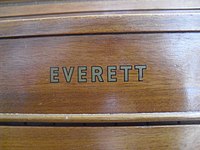
The Hammond organ is an electric organ invented by Laurens Hammond and John M. Hanert and first manufactured in 1935. Multiple models have been produced, most of which use sliding drawbars to vary sounds. Until 1975, Hammond organs generated sound by creating an electric current from rotating a metal tonewheel near an electromagnetic pickup, and then strengthening the signal with an amplifier to drive a speaker cabinet. The organ is commonly used with the Leslie speaker.
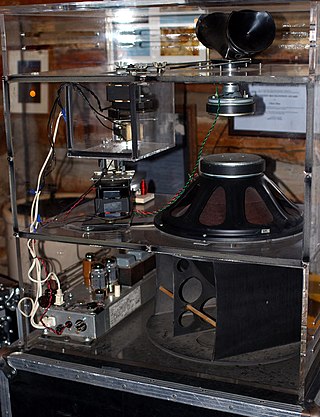
The Leslie speaker is a combined amplifier and loudspeaker that projects the signal from an electric or electronic instrument and modifies the sound by rotating a baffle chamber ("drum") in front of the loudspeakers. A similar effect is provided by a rotating system of horns in front of the treble driver. It is most commonly associated with the Hammond organ, though it was later used for the electric guitar and other instruments. A typical Leslie speaker contains an amplifier, a treble horn and a bass speaker—though specific components depend upon the model. A musician controls the Leslie speaker by either an external switch or pedal that alternates between a slow and fast speed setting, known as "chorale" and "tremolo".

KORG Inc., founded as Keio Electronic Laboratories, is a Japanese multinational corporation that manufactures electronic musical instruments, audio processors and guitar pedals, recording equipment, and electronic tuners. Under the Vox brand name, they also manufacture guitar amplifiers and electric guitars.

Yamaha Corporation is a Japanese musical instrument and audio equipment manufacturer.

The Yamaha DX7 is a synthesizer manufactured by the Yamaha Corporation from 1983 to 1989. It was the first successful digital synthesizer and is one of the best-selling synthesizers in history, selling more than 200,000 units.
Kawai Musical Instruments Manufacturing Co., Ltd. is a musical instrument manufacturing company headquartered in Hamamatsu, Shizuoka, Japan. It is best known for its grand pianos, upright pianos, digital pianos, electronic keyboards and electronic synthesizers. The company was founded in August 1927.

Rodgers Instruments Corporation is an American manufacturer of classical and church organs. Rodgers was incorporated May 1, 1958 in Beaverton, Oregon by founders, Rodgers W. Jenkins and Fred Tinker, employees of Tektronix, Inc., of Portland, Oregon, and members of a Tektronix team developing transistor-based oscillator circuits. Rodgers was the second manufacturer of solid state oscillator-based organs, completing their first instrument in 1958. Other Rodgers innovations in the electronic organ industry include solid-state organ amplifiers (1962), single-contact diode keying (1961), reed switch pedal keying for pedalboards (1961), programmable computer memory pistons (1966), and the first MIDI-supported church organs (1986).
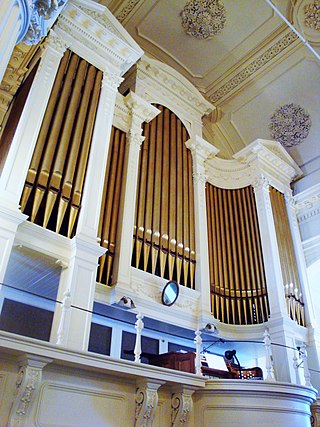
Æolian-Skinner Organ Company, Inc. of Boston, Massachusetts was an American builder of a large number of pipe organs from its inception as the Skinner Organ Company in 1901 until its closure in 1972. Key figures were Ernest M. Skinner (1866–1960), Arthur Hudson Marks (1875–1939), Joseph Silver Whiteford (1921-1978), and G. Donald Harrison (1889–1956). The company was formed from the merger of the Skinner Organ Company and the pipe organ division of the Æolian Company in 1932.
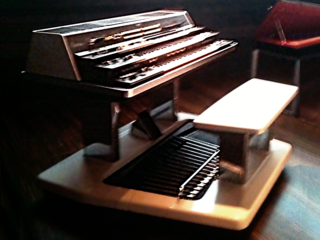
An electric organ, also known as electronic organ, is an electronic keyboard instrument which was derived from the harmonium, pipe organ and theatre organ. Originally designed to imitate their sound, or orchestral sounds, it has since developed into several types of instruments:
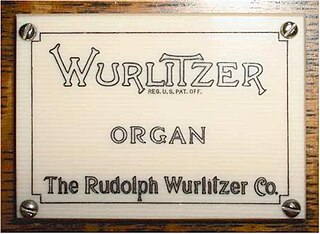
The Rudolph Wurlitzer Company, usually referred to as simply Wurlitzer, is an American company started in Cincinnati in 1853 by German immigrant (Franz) Rudolph Wurlitzer. The company initially imported stringed, woodwind and brass instruments from Germany for resale in the United States. Wurlitzer enjoyed initial success, largely due to defense contracts to provide musical instruments to the U.S. military. In 1880, the company began manufacturing pianos and eventually relocated to North Tonawanda, New York. It quickly expanded to make band organs, orchestrions, player pianos and pipe or theatre organs popular in theatres during the days of silent movies.
C. G. Conn Ltd., sometimes called Conn Instruments or commonly just Conn, is a former American manufacturer of musical instruments incorporated in 1915. It bought the production facilities owned by Charles Gerard Conn, a major figure in early manufacture of brasswinds and saxophones in the USA. Its early business was based primarily on brass instruments, which were manufactured in Elkhart, Indiana. During the 1950s the bulk of its sales revenue shifted to electric organs. In 1969 the company was sold in bankruptcy to the Crowell-Collier-MacMillan publishing company. Conn was divested of its Elkhart production facilities in 1970, leaving remaining production in satellite facilities and contractor sources.
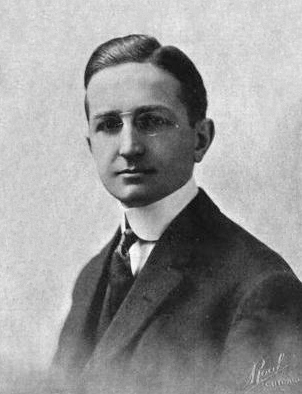
Ernest Martin Skinner was an American pipe organ builder. His electro-pneumatic switching systems advanced the technology of organ building in the first part of the 20th century.

Rogers Drums is an American multinational drum manufacturer. It was founded in 1849 and originally based in Covington, Ohio. During the twentieth century, their drums enjoyed popularity with musicians spanning from the Dixieland jazz era in the 1920s to classic rock in the 1960s and 1970s, but was particularly associated with big band and swing drummers of the 1940s and 1950s.
HDC YoungChang is a South Korean manufacturer of pianos and industrial wood working machinery, headquartered in Incheon, South Korea. Young Chang currently holds 50% of the South Korean piano market. The company is among the largest and most automated of the world's piano manufacturers.
Electone is the trademark used for electronic organs produced by Yamaha. With the exception of the top end performance models, most Electones are based on the design of the spinet electronic organ. Current models are completely digital and contain a variety of sounds, effects, and accompaniments, on top of the ability to store programming data onto memory devices.

Mason & Hamlin is a piano manufacturer based in Haverhill, Massachusetts. Founded in 1854, they also manufactured a large number of pump organs during the 19th century.
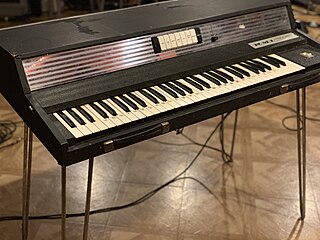
Rocky Mount Instruments (RMI) was a subsidiary of the Allen Organ Company, based in Rocky Mount, North Carolina, active from 1966 to 1982. The company was formed to produce portable musical instruments, and manufactured several electronic pianos, harpsichords, and organs that used oscillators to create sound, instead of mechanical components like an electric piano.

The Estey Organ Company was an organ manufacturer based in Brattleboro, Vermont, founded in 1852 by Jacob Estey. At its peak, the company was one of the world's largest organ manufacturers, employed about 700 people, and sold its high-quality items as far away as Africa, Great Britain, Australia, and New Zealand. Estey built around 500,000 to 520,000 pump organs between 1846 and 1955. Estey also produced pianos, made at the Estey Piano Company Factory in New York City.

Torakusu Yamaha was a Japanese businessman and entrepreneur known as the founder of the Yamaha Corporation.
